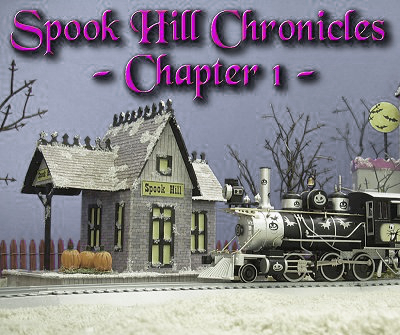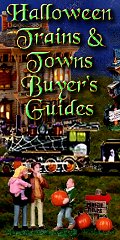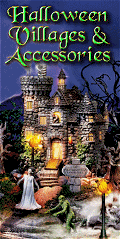Spook Hill ChroniclesTM
by Paul D. Race
for HalloweenTrains.comTM
Chapter 1
Before she moved to Spook Hill, the second most frightening thing that ever happened to Megan Forrester was the visit from the oil company representative to tell her that her husband Bert had been washed overboard from a platform in the Gulf and was presumed dead.
The most frightening thing was a subsequent visit from Whitey Reynolds, which suddenly made moving to Spook Hill look safer than staying where she was.
"Spook Hill" was a nickname, of course—the town's real name was Fosterville. Megan first heard of the place when she was sorting through Bert's papers and discovered a deed to a property she had never heard of. When she contacted a real estate agent in the area to find out more, the news wasn't encouraging. Apparently the whole town of Fosterville was condemned forty years ago because of a huge CCA spill at a nearby lumber company - thousands of gallons of arsenic had spilled into the town's groundwater. The houses were still standing, but nobody lived there but the "ghosts." That explained the nickname. To make it worse, the only automobile-worthy bridge had collapsed —you couldn't even get to the place now except by a local train that only ran on "demand," a few times a year. And maybe a ferry—there was a ferry station that never seemed to be manned.
By the time Megan found the deed and placed the call, Bert's company had already explained to Megan that she would be getting only the minimum survivor's benefit. They claimed that Bert's accident was due to his own negligence. Megan knew that was a lie but couldn't prove it. The company said nothing about how Megan was expected to support her eight-year-old Harry or eleven-year-old Jessica, much less put them through college, which had been her dream.
A few of Bert's roughneck buddies had offered to break the company rep's legs, as a comfort to Megan, but she declined their well-meant offer.
Megan put Bert's pickup up for sale, and got some interest. But the "For Sale" sign in the front yard of their house wasn't drawing much attention. The only offer that had come in so far would barely allow her to pay off the mortgage, so she had turned it down without even a counter offer. Soon, Megan's mortgage payments were coming from their already scant savings—if the house didn't sell soon, they would be both homeless and penniless.
Then, to her surprise, the real estate agent near Fosterville called her back. It turned out that the property might not be entirely worthless. A lineman who had serviced a trunk line nearby told her that most of the houses still looked surprisingly livable, considering their decades of neglect.
"What about the poison?" Megan wanted to know. But the agent was ahead of her. As it turned out, that was a hoax, perpetrated by an amusement park company that was trying to get the land cheap then went bankrupt trying to set it up. Actually, the amount of arsenic in Fosterville's ground water was lower than the national average. If there ever was a chemical spill, it was much smaller than reported.
Best of all, when the real estate agent checked the county records, she could find no record that the property had ever changed hands – neither the county, nor the state, nor the amusement park company had ever paid Bert's great aunt Sarah for the property. So if Megan could afford the back taxes, she could have it. Even better, the property was still appraised at its decades-old condemned value, so the back taxes were very low, considering.
Still, a move to "Spook Hill" hardly seemed worth considering until Whitey Reynold's "visit."
It began when a big, white SUV with gold-plated trim pulled into the Forrester family's driveway. The windows were heavily tinted, but that wasn't rare in the Gulf states. It could have been anyone, someone else from the company with more bad news, a real estate agent with questions, even one of Bert's buddies. But because she didn't recognize the car, Megan told the kids to go into the back room until she saw who it was.
Ringing the doorbell was a tall, slender man in white shoes, white casual slacks, a white polo shirt, and a white silk sports jacket. Most remarkable was his hair, which glistened even whiter than his clothes or his car, even though his other features implied that he was in his late thirties.
Megan opened the door a crack, wondering if the little chain would actually deter anyone who really wanted to get in.
"Hi," the stranger said. "I'm Whitey Reynolds. I'm a business associate of your late husband's. Mind if I come in?"
Megan did mind. "He never mentioned you, Mr. Reynolds."
"Please call me Whitey. Everybody does. My real name is William, but, well, you can see. . . ."
Looking past Whitey, Megan couldn't tell if anyone else was in the car. But she could see a busybody down the street watching while pretending to water her roses.
"Your business, Mr. Reynolds?"
"Well, just think of this as a condolence visit. Please. It's hot out here. And people are starting to stare." Whitey was right; another neighbor had joined the informal "watch."
Megan asked, "Would you have any objection to sitting over there in the shade and talking?"
"Not at all," said Whitey, and stepped off the porch.
Megan pocketed her cell phone before she followed him outside and onto the side lawn. In spite of the stranger's "good ole boy" smile, she wished she had taser or maybe a revolver that she could drop into the other pocket.
Whitey chose a chair with his back to the house, from which he could survey the street. Megan's neighbors, aware that they were being watched in return, suddenly lost interest Megan's "visitor."
As soon as Megan sat down, Whitey said, "Now, this is better. You have a nice place here, Mrs. Forrester. Nice kids, too from what I hear."
"Leave my children out of this. It's time to state your business."
Whitey leaned forward with an earnest expression. "Well, you see, for several years, Bert has been doing, er, business with my employers. It's the kind of business that some years are better than others, if you know what I mean."
With a sick feeling in her stomach, Megan realized exactly what Whitey meant. Bert wouldn't be the first roughneck to hide big gambling losses from his family. Sometimes she wondered if there was a shuttle service between the offshore rigs and the shore-line casinos—those "institutions" that had promised to save the economy of several Gulf communities, but which, one wag had estimated, destroyed one family for every hundred dollars they paid in taxes.
Megan's stomach ache quickly turned to anger. "Listen, I just lost my husband. I'm about to lose my house. I have no idea why you're telling me this now, or what you expect to get out of me."
Whitey responded in his kindest voice yet. "Please, Mrs. Forrester, I'm not here to get anything out of you. We pulled your credit report, and nobody thinks you're hiding anything."
When Whitey said, "We pulled your credit report," a different kind of fear came over Megan. What else had they checked up on? But before she could speak, a back door of the SUV flew open, and a dark-haired girl, about six, jumped down onto the driveway. The driver's side door opened as well, and a dark-haired woman leaned out to shout, "Roberta, get back in the car."
"But I hafta go potty!" shouted Roberta. By now, Whitey was on his feet. He shouted, "Maria, I asked you to keep the kids in the car." Roberta ran to Whitey and grabbed him around the waist. "Please, Daddy," she begged.
Whitey looked at Megan, who was also standing by now. With a shrug that hid fear, anger, and loathing, she told Roberta, "Come here, sweetie, I'll show you in." When they reached the front door, Megan called inside. "Jessie, can you come get Roberta and show her where the bathroom is?" Whitey stayed discreetly near the lawn chairs. When Megan turned back around, Maria waved at her and said, "Thank you. I'm sorry about that."
"No problem," Megan shouted back with an attempt to smile, and Maria closed her car door. But it was a problem. As soon as Megan had rejoined Whitey, she said, "You brought your family to a shakedown? What kind of monster are you?"
"I'm sorry," said Whitey. "I'm not the monster you think. But the people I work for, they are. They're the kind of people who'd find out I was passing nearby on a family trip and ask me to take a message."
"Well you can tell them, message received."
"Well, actually, I'm not done."
"I think you are, unless you want me to stroll over and tell Maria what you really do for a living. Or does she know?"
"No, she doesn't. And you've guessed right. I'd like to keep it that way. Which is why you probably shouldn't try to threaten me."
To Megan's astonishment, Whitey was still smiling as he delivered that last line. More angry than frightened, Megan said, "Tell me, Mr. Whitey Reynolds. What would you do if somebody like you stopped by your house and had this conversation with Maria while Roberta hid in the back room? Does your family actually mean anything more to your bosses than my family does?"
"Now that's something to think about, isn't it?" For a moment, Whitey dropped the "good ole boy" grin and looked her straight in the eyes. "If it was my family, I'd go off the grid as fast as I could."
Megan had a sense that Whitey was telling her more than he was telling her. She tilted her head, like a robin listening to the ground, an involuntary habit whenever she was listening intently. "But wouldn't they find you?"
Whitey said, "It's tough. They have their hooks into the Fed, into the phone companies, into the credit agencies, you name it. They'll listen in on phone calls to your relatives. They'll use your cell phone to track your movements. They'll hack your credit card. They'll hack the company's accounts so they'll know where you're getting your pension checks. They'll hack your kids' e-mail and Facebook accounts. They'll even hack your social security records, so they know if you're working or drawing benefits for your kids."
"So we're safer if I stay put and hope they lose interest."
"Probably in the long run. But it's not what I'd do." Something in Whitey's eyes told her he wasn't talking about his family, but hers.
Roberta burst out of the front door, ran to Whitey and grabbed his hand. Whitey said, "Roberta, honey, go back to the car. I'll be through here in a minute."
As Roberta ran back the car, Megan said, "That's okay, Whitey, I think you're done here."
"No I'm not," said Whitey, looking even more grim, as Roberta ran back to the car and climbed in. "Listen closely to this. My bosses tell me Bert was into them for over a quarter of a million dollars." Megan's heart stopped, but she nodded for him to go on. "The rest of the message is this: If your husband isn't dead and they find out, you'll all wish he was. All of you. Sorry, that's the message." Megan collapsed into a lawn chair.
She finally got out, "Who are you Whitey Reynolds? How do you have the nerve to come to a widow's home with that kind of threat when her children are in the house?"
Whitey sat down across from Megan and looked into her eyes as he said, "Think of it this way. At least you know where your children are."
A cold fear gripped Megan's heart as if an iron hand had reached right into her chest. Whitey must have noticed her face grow pale.
"So now you're afraid," he said. "Let me tell you; you're not afraid enough. Listen, my colleagues like to kid me about my hair—they say I got frightened as a child and my hair turned white. But the truth is scarier than that. My dad was a snake-handler. When I came down with scarlet fever, they laid hands on me instead of taking me to the doctor. I lived, as you can tell, but the fever made my hair white and it's been white ever since."
Megan started to interrupt, but he went on, "No, you asked me who I was. When I got old enough to join the family business, Pa taught me how to 'milk' the vipers so they'd be out of venom when it was time for the service. So when I say I grew up with snakes, I'm not exaggerating."
Again Megan tried to interrupt, but Whitey went on. "No, I'm almost done. What I'm trying to tell you is that the folks I work for are meaner than any snake I ever met. Way more dangerous. There. I've had my say."
As Whitey rose, his grin came back, and he reached out for her hand. In shock, she offered it to him. Before she began to recover, the Reynolds family car was gone and so was any hope of staying anywhere that Whitey's employers could find her family.
Suddenly Spook Hill wasn't just an option. It was the only option.
Megan had seen enough cop and spy shows to know what to do next. Fortunately the kids were out of school for the summer, so she didn't have to work around that.
Megan bought a "disposable" cell phone and stopped using her own cell or house phone for anything but routine calls. She used the burner phone to contact her real estate agent and ask if the folks whose offer she had rejected would be still open to a counter offer. They would. She made a show of checking rental properties around town, and cleaning out her house for a "moving sale." She even put a small deposit on a run-down old apartment, wincing because she knew she'd never see the money again.
Telling the kids they would have to move there, she bought a bunch of plastic storage bins had them pack everything they would be taking into them. Clothes, books, videos, etc. She was merciless with things like games they never played, shoes Jessica never wore, and clothes Harry was on the verge of outgrowing.
While she was making all of these secretive preparations, she kept thinking back to all the spy and suspense movies she had ever seen. In Pelican Brief, the baddies had followed Julia Roberts by her credit card purchases. So, no credit cards once they left town, and no tickets anywhere. After a while, she began evaluating every decision by a "WWJD" rubric—"What would Jason do?"—Jason being Jason Bourne, of course.
She used a library computer to plan a route to Fosterville using all back roads. Several times during all of these preparations, it occurred to her that she was being melodramatic. But then she would remember Whitey warning her with a smile not to threaten him. And she would determine again to do what she could to keep her kids safe.
After checking the manual to make certain it didn't have a GPS, Megan sold Bert's old truck for half of what it was probably worth, just to get it out of the way and recoup a few dollars. The day the truck sold, both Jessie and Harry refused to eat or cooperate with her in anyway—for some reason the truck selling brought their father's death home to them more than the memorial service or taking all his clothes to the Salvation Army.
By the time the sale of her house was finalized, Megan had cleared only about eight thousand dollars over the mortgage. She deposited the cashier's check into the bank, after finding out she could access it in a week.
The day before her planned departure, she and the kids held a "moving sale." Every piece of furniture and everything that wasn't in a bin already went onto tarps and tables in the front yard for a tiny fraction of what she would have usually priced it. This served two purposes: It gave her a little more cash. And it allowed her to fit the minivan into the garage for the first time in years.
That night she told the kids they were moving first thing in the morning. So they should pack the van. With a great deal of whining and questions Megan wasn't ready to answer yet, they loaded the van with the garage door closed.
Early in the morning, Megan pulled the van out of the garage with the kids inside, then closed the garage door and locked the house. She drove the back way out of her neighborhood, then treated the kids to breakfast at a McDonalds across town, wondering how to tell them they might never see their friends again.
While the kids were eating, Megan stepped out into the parking lot and used her old cell phone to call the Salvation Army, give them her address, and tell them they were welcome to everything on their front yard. Then, using a list she had prepared ahead of time, she canceled her utilities, house phone and cell-phone service. Once the kids were back in the van, she made sure no one was looking, smashed her old cell phone in the parking lot, paying special attention to the SIM card. Then she stuck the pieces inside a Happy Meal box, crushed that, and threw it all into the trash.
Megan had to leave her bank account open because Bert's insurance and social security benefits were going in there. Not that she'd have much access if she went into hiding. But the minute that the bank was open, Megan went in to withdraw everything she could withdraw in cash without having to close the account. Her entire fortune was $13,532.67. The bank manager kept asking her questions; he was apparently afraid that Megan was falling for some sort of scam. But she assured him she knew exactly what she was doing. And if he wanted Bert's social security checks to keep going into his bank, he'd let her do what she needed to do.
Back in the van, after convincing herself she wasn't being followed, she turned toward the first of several long back roads that would take her to the station where they could catch the train to Fosterville. The drive would take hours. Finally Megan explained to the kids that they were going to a long-lost relative's old house to see if they could live there, at least for the summer. They were both upset, even though Megan "left the door open" for a return to their home town eventually, if this didn't work out.
When Jessica realized that world-class whining wouldn't dissuade her mom from this scheme, she asked, "Where are we going, anyway?"
"It's a very small place called Fosterville."
"Uh, how small?" asked Jessica.
Megan really didn't know how to put a positive spin on it. She finally said, "Well, it's a sort of a ghost town."
"Cool!" said Harry, at the same time Jessica was saying, "A ghost town? Mom, are you kidding?"
Megan sighed and said, "I wish I was."
Jessica said, "But why? I mean those rentals we looked at were dumps, but we could have stayed in town at least."
Megan realized she had missed a turn and told them to keep quiet until she could get her bearings. Thankfully, both kids were dozing by the time she was back on the right road, and she could drive in peace and quiet for a while.
The train station was just as run-down and out-of-the-way as she had expected it to be. Megan parked the minivan in the shade, cracked the windows, and left the kids to sleep. When she went to buy three round-trip tickets, though, she got a bemused look from the ticket agent. "Here she is," he announced loudly. And suddenly she sensed movement elsewhere in the station, but she saw no one else. The agent said, "Just go on outside; Jimmy will help you get your stuff. The train you want is through that door."
Knowing she'd have to go back to van first, Megan couldn't help glancing out the door that the ticket agent identified. There was an old-fashioned steam engine, black, but with purple and orange trim. The ancient wooden coaches behind it were painted in similar colors. Most surprising was the name painted on the coal car in old-fashioned lettering: "Spook Hill Express."
Mabel realized that the ticket agent was watching her, and that she needed to close her mouth. "What is that?" She demanded.
The agent laughed. "Didn't you know? A while back, a fellow tried to buy Fosterville and set up a theme park there. He sunk a bunch of money into it, but the park never opened. About all that's left is this old train, which we hardly ever get to run."
After everything that had happened so far, Megan felt like she couldn't handle one more complication. "Who's 'we'?"
"Oh, our train club. We come out whenever we get a call and get her fired up. Don't be surprised if some of us look a little goofy—we like to dress up for the part."
As if on cue, a cadaverous-looking man in a ragged conductor's uniform entered the building and said, "Mrs. Forrester? We're ready to start boarding."
| 






































